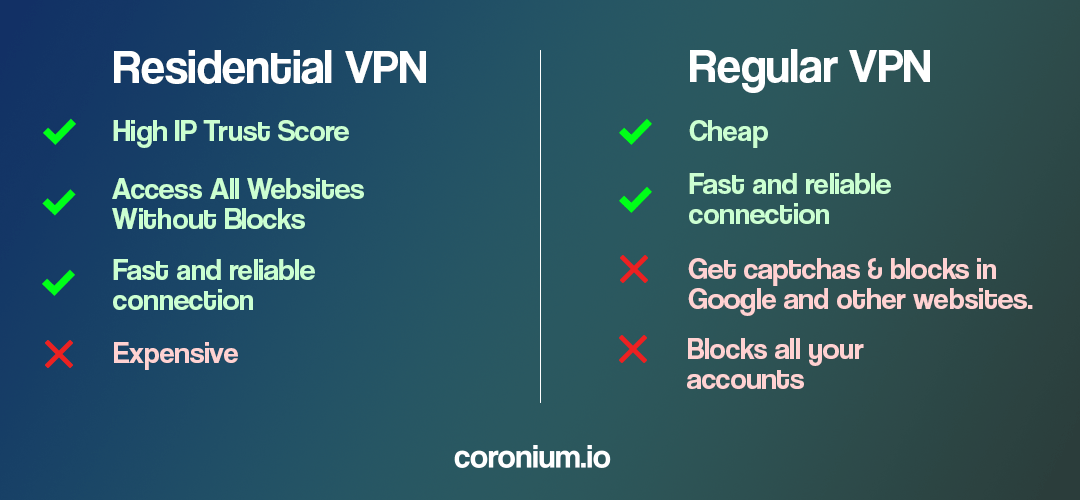Home » Residential VPN » Residential VPN vs Regular VPN: Understanding the Key Differences
Residential VPN vs Regular VPN: Understanding the Key Differences

What is a Residential VPN?
Virtual Private Networks (VPNs) have become increasingly popular in recent years as people become more concerned about their online privacy and security. While both Residential VPNs and Regular VPNs serve the purpose of providing a secure and encrypted connection to the internet, there are some key differences between the two.

A Residential VPN is a type of VPN service that provides a user with a connection to the internet that is sourced from a residential IP address. This means that the connection appears to come from a home-based or 4G mobile internet connection rather than a server or data center. Residential VPNs are typically provided by companies that have access to a large pool of residential IP addresses and are able to offer these connections to users on a rental basis.
In this article, we will discuss the main differences between Residential VPNs and Regular VPNs, and highlight the key advantages and disadvantages of each type of VPN. Let’s explore which one might be the better choice for you.
In this article, we will discuss the main differences between Residential VPNs and Regular VPNs, and highlight the key advantages and disadvantages of each type of VPN. Let’s explore which one might be the better choice for you.
What is a Regular VPN?
A Regular VPN, also known as a Commercial VPN, is a type of VPN service that provides a user with a connection to the internet that is sourced from a server or data center. Unlike Residential VPNs, Regular VPNs do not use residential IP addresses, but rather IP addresses that are owned and operated by the VPN provider. Here are some great regualr VPN providers:
To learn key difference between Mobile and Residential IP, read this article: Ultimate Guide To All Proxy Types
Advantages and Disadvantages of Residential VPNs
One of the main benefits of Residential VPNs is that they are much less likely to be detected and blocked by websites and services that try to block VPN connections. This is because Residential VPNs use IP addresses that are sourced from residential internet connections, like 4G connections from phones, or just regular modems at people’s homes, which are much less likely to be identified as VPNs. As a result, users are able to access websites and services that are restricted to users in a specific geographic location, such as streaming services like Netflix and Hulu.
Advantages
- Provides basic online privacy and security
- Hides IP address and personal information
- Avoids blocks and captchas with 95% IP trust score
- Appears as a real user
- Enables account management without restrictions
- Provides access to websites without verifications
- Mimics a home, office or mobile network connection
- Ideal for account management and scraping purposes
Disadvantages
- May be more expensive than regular VPN
- Limited availability in certain regions
Advantages and Disadvantages of Regular VPNs
One of the main benefits of Regular VPNs is that they are generally faster and more reliable than Residential VPNs. This is because Regular VPNs use servers and data centers that are specifically designed for VPN connections and are optimized for speed and reliability. Additionally, Regular VPNs typically offer a wider range of server locations, which makes it easier for users to find a server that is close to their location and offers the best possible connection speed.
Another benefit of Regular VPNs is that they are generally easier to set up and use than Residential VPNs. This is because Regular VPNs are typically provided by companies that specialize in VPN services and have a more established infrastructure and support system in place.
Another benefit of Regular VPNs is that they are generally easier to set up and use than Residential VPNs. This is because Regular VPNs are typically provided by companies that specialize in VPN services and have a more established infrastructure and support system in place.
Advantages
- Provides basic online privacy and security
- Hides IP address and personal information
- More affordable than Residential VPN
- More widely available in different regions
- Easier to set up and use
- Offers access to geo-restricted content that don't have strong VPN detection systems
Disadvantages
- Can be blocked by websites and services
- May not be ideal for account management and scraping purposes
- Can be detected by certain websites and services thus prompting verifications for your accounts and services
- Does not provide the same level of anonimity as a Residential VPN.
Which is the better choice - Residential VPNs or Regular VPNs?
The choice between Residential VPNs and Regular VPNs ultimately comes down to the specific needs and preferences of the user. If you are looking for a VPN that is less likely to be detected and blocked by websites and services, and that offers a higher level of security, then a Residential VPN might be the better choice for you.
On the other hand, if you are looking for a VPN that is faster, more reliable, and easier to use, then a Regular VPN might be the better choice. Ultimately, the choice between Residential VPNs and Regular VPNs will depend on the specific needs and preferences of the user.
On the other hand, if you are looking for a VPN that is faster, more reliable, and easier to use, then a Regular VPN might be the better choice. Ultimately, the choice between Residential VPNs and Regular VPNs will depend on the specific needs and preferences of the user.
Conclusion
In conclusion, both Residential VPNs and Regular VPNs serve the purpose of providing a secure and encrypted connection to the internet. However, there are some key differences between the two, including the source of the IP address, the speed and reliability of the connection, and the level of security and privacy offered. It is important for users to carefully consider their specific needs and preferences when choosing between a Residential VPN and a Regular VPN.
When making your decision, it is also important to consider the reputation of the VPN provider and their commitment to protecting user privacy and security. You should look for a VPN provider that has a strong privacy policy, uses strong encryption protocols, and is transparent about its logging practices.
Ultimately, the choice between a Residential VPN and a Regular VPN will depend on your specific needs and preferences. Whether you are looking for a VPN that is more secure, more reliable, or easier to use, there is a VPN service out there that will meet your needs. By taking the time to research and compare the different VPN services available, you can be confident that you are making the best choice for your specific needs
When making your decision, it is also important to consider the reputation of the VPN provider and their commitment to protecting user privacy and security. You should look for a VPN provider that has a strong privacy policy, uses strong encryption protocols, and is transparent about its logging practices.
Ultimately, the choice between a Residential VPN and a Regular VPN will depend on your specific needs and preferences. Whether you are looking for a VPN that is more secure, more reliable, or easier to use, there is a VPN service out there that will meet your needs. By taking the time to research and compare the different VPN services available, you can be confident that you are making the best choice for your specific needs
Related Articles
POST & INFOGRAPHIC · 7 MIN READ
POST & INFOGRAPHIC · 5 MIN READ